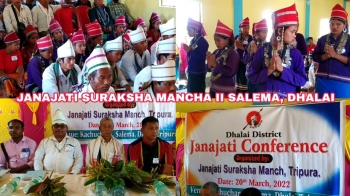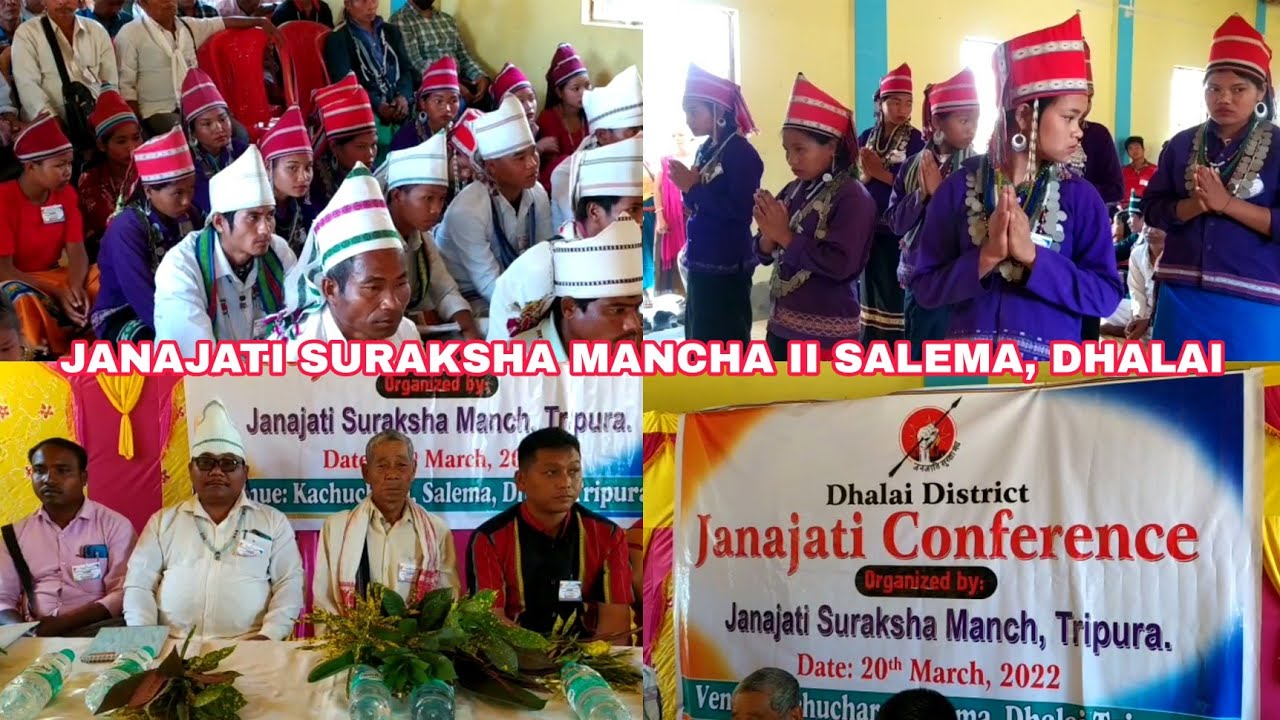
.jpg) Thomas Malsom
Thomas Malsom

Tripura is the second smallest state in the North-Eastern region but has the second largest population in the region (of nearly 4 million), next to Assam. The state is bordered by Bangladesh almost on all sides and is connected to the rest of India only by its northernmost points.
It has frequently served as an example for the people of other states whenever any sort of unrest, turbulent situation or turmoil arises with the common phrase ‘we do not want to be the next Tripura.’ This phrase for the people of Tripura may not be pleasant to hear; in fact, this phrase has recurrently sparked contentious debates and discussions. For obvious reasons, however, this phrase is now regularly used in reference to the current state of affairs that tribal people are in, such as the ‘demographic imbalance’ that has made Tripura perhaps the only state in India where the indigenous communities (first settlers) are compelled to become a minority (with 31.8 %, according to the 2011 census).
The ‘land question’ is another crucial aspect because, despite being granted Autonomous District Council (ADC) and having constitutional protective provisions like the 6th Schedule, tribal communities do not have full-fledged autonomy over their land and resources. Instead, mega projects under the guise of development programmes continue to wreak havoc on the tribal livelihood exacerbating their social inequality and broadening socio-economic disadvantages. Tripura is still being used as a testing ground or experimentation which came to light when Janajati Suraksha Mancha: Tripura Chapter demanded ending/scrapping all government perks and benefits offered to the tribal people who have converted to Christianity.
Janajati Suraksha Mancha (JSM): Tripura Chapter, considered to be an affiliate group of the right-wing regime, which represents the indigenous/ethnic/tribal people adhering to indigenous faiths, has petitioned the government to remove those tribals who have undergone religious conversion from the list of Schedule Tribe (ST). Their main concern is that indigenous faiths and culture have long been threatened by the conversion of tribal people to foreign religion which is Christianity.
In tune with these objectives, Kartik Tripura, joint convener of the JSM, Tripura Chapter, revealed to EastMojo on July 15: “On July 13 last, a state-level conference of our generation was held in Agartala. The community heads of different tribal groups attended the meeting and expressed their views. The central topic of discussion was the scrapping of Schedule Tribe status to the people who had converted to other faiths. By default, they become entitled to benefits as religious minorities. For that Article 342 of the Indian Constitution needs to be amended.”
Justifying his stand, he further stated that “The Scheduled Tribe benefits are extended to people for the protection of their culture and social customs. Those who got converted to other religions have nothing in common with the traditional tribal culture and customs. They follow an altogether different path. Besides, a section of these people are accessing dual benefits both for ST status and as religious minorities. If one person gets benefits by government schemes and funds allocated under two separate departments it is quite discriminatory for the rest of the others.”
Considering Mr Tripura’s claim that the tribal Christians benefit from numerous departmental schemes and programmes and as religious minorities, he is alluding to the progress of the tribal Christians. Therefore, it is imperative to look into the benefits or progress of the Christian tribals that he is referring to. When one picks up any field of development sector to understand tribal development and if someone claims that tribals of Tripura benefited from development schemes, especially the Christian tribals, they are daydreaming. For example, we can begin with the education development programmes by the state government for tribal people, where despite the existence of various educational schemes, many schools have ceased to operate in the tribal-dominant rural villages and very subpar classes and education are being delivered in the state as a whole.
Next, considering the areas of development projects/schemes involving forest land and livelihood, unchecked and unregulated Agro-forestry programmes are expanding in the forest habitation zones further destroying the livelihood of the tribals. The Forest Rights Act (FRA) of 2006 was put into effect to redress injustices that made the tribes marginalised communities. Although they were granted access to land entitlement i.e., patta under FRA, tribal people have only received user rights for minor forest produce. Large-scale projects like dams and resource extraction severely impair the livelihood of the tribal population; they are also being evicted from their own land.
In some projects, in the name of tertiary treatment of waste/garbage management, tribal villages are used as landfill without regard for biodiversity or sustainability of the environment. In many villages, in the upland hill areas, tribal communities struggle with a lack of access to clean water. Empty water containers lining up the national highway (NH8) near the Atharamura Hill Range, broken pipes, non-functional water tank or tube wells on the roads are self-explanatory and a testament to the water insecurity.
Additionally, the numerically smaller tribal communities, like the Karbong, whose ethnic identity, culture, tradition, and language are not adequately documented and safeguarded continue to be swindled under the homogenizing process and are on the verge of extinction. This is the devastating situation experienced by the tribal communities and which are also equally faced by the Christian tribals in Tripura since they all dwell together.
So, what sort of benefits or advantages, as claimed by the JSM, Tripura Chapter, are extended to the Christian tribals from the government schemes and/or from being a Christian minority in Tripura? Instead, the Christian missionaries’ selfless contribution merits tremendous gratitude in safeguarding the tribals’ culture and tradition whereas the state government fails to do so. On the other hand, the state’s attempt at cultural homogenization fostering the use of a common language like Devanagarti script for indigenous language/dialect in documentation is an effort to forcibly assimilate them into the dominant society in Tripura.
This move has brought changes in the social structure of the tribals, whereas Christian missionaries do not interfere with it. For example, despite Christianity being frequently dismissed as anthropogenic, a notable contribution made by the Christian missionaries is the preservation of indigenous languages by documenting and cataloguing the indigenous word and providing quality education in Tripura.
Henceforth, given the foregoing debate, one should attempt to comprehend the underlying ideology and should view the JSM initiatives as a strategy of the ruling regime to dismantle unity among the indigenous people. As an illustration, the current situation in Manipur is the experimentation/result of a similar political strategy in which they are somehow successful in fostering and destroying the unity among the native communities. Attacks on the Christian tribal groups are nothing new, but despite Manipur and Tripura having experienced ethnic conflict, churches belonging to Schedule Tribes (ST) have been least destroyed.
Prior to the Manipur issue, the same thing was experimented in Assam, in the name of Janajati Dharma Sanskriti Suraksha Mancha (JDSSM) of Assam that demanded the same thing that STs converted to Christianity be removed or de-listed from the list of STs and that Article 342 of the Indian Constitution be amended to protect the existence of the genuine STs in India. Following the experiments in Assam and Manipur, the current experiment is in Tripura with the sole intent of causing division and breaking Thansa (unity) among the Indigenous tribal communities in the name of religion to destabilise the North-East.
(The writer is a PhD candidate at the Department of Sociology, North-Eastern Hill University, Shillong. Formerly, he has taught Sociology in Holy Cross College, Agartala. Email id: mcthomashlutie@gmail.com)